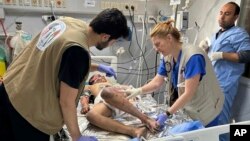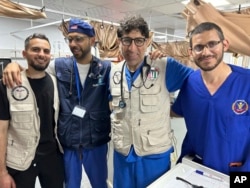The 35 American and other international doctors came to Gaza in volunteer teams to help one of the territory's few hospitals still functioning. They brought suitcases full of medical supplies and had trained for one of the worst war zones in the world. They knew the health care system was decimated and overwhelmed.
The reality is even worse than they imagined, they say.
Children with horrific amputations. Patients with burns and maggot-filled wounds. Rampant infections. Palestinian doctors and nurses beyond exhausted after seven months of treating never-ending waves of civilians wounded in Israel's war with Hamas.
"I did not expect that [it] will be that bad," said Dr. Ammar Ghanem, an intensive care unit specialist from Detroit, Michigan, with the Syrian American Medical Society. "You hear the news, but you cannot really recognize ... how bad until you come and see it."
Israel's incursion into the southern Gaza city of Rafah has exacerbated the chaos. On May 7, Israeli troops seized the Rafah crossing into Egypt, closing the main entry and exit point for international humanitarian workers. The teams were trapped beyond the scheduled end of their two-week mission.
On Friday, days after the teams were supposed to leave, talks between U.S. and Israeli authorities yielded results, and some of the doctors could get out of Gaza. At least 14, including three Americans, however, chose to stay, according to one of the organizations, the Palestinian American Medical Association. The U.S.-based nonprofit medical group FAJR Scientific, which organized a second volunteer team, could not immediately be reached. The White House said 17 Americans left Gaza on Friday, and at least three chose to stay behind.
Those who left included Ghanem, who said the 15-mile trip from the hospital to the Kerem Shalom crossing took more than four hours as explosions went off around them. He described some tense moments, such as when an Israeli tank at the crossing took aim at the doctors' convoy.
"The tank moved and blocked our way, and they directed their weapons [at] us. So that was a scary moment," Ghanem said.
The two international teams have been working since early May at the European General Hospital, just outside Rafah, the largest hospital still operating in southern Gaza. The volunteers are mostly American surgeons but include medical professionals from Britain, Australia, Egypt, Jordan, Oman and other nations.
The World Health Organization said the United Nations, which coordinates visits of volunteer teams, is in talks with Israel to resume moving humanitarian workers in and out of Gaza. The Israeli military said it had no comment.
Shattered system
The doctors' mission gave them a firsthand look at a health system that has been shattered by Israel's offensive in Gaza, triggered by Hamas' October 7 attack on southern Israel. Nearly two dozen hospitals in Gaza are no longer operating, and the remaining dozen are only partially working. Israel's campaign has killed more than 35,000 Palestinians and wounded more than 79,000, according to Gaza health officials. Almost 500 health workers are among the dead.
The military's nearly 2-week-old Rafah operation has sent more than 600,000 Palestinians fleeing the city and scattering across southern Gaza. Much of the European Hospital's Palestinian staff left to help families find new shelter. As a result, the foreign volunteers are stretched between medical emergencies and other duties, such as trying to find patients inside the hospital. There is no staff to log where incoming wounded are placed. Medicines that the teams brought with them are running out.
Thousands of Palestinians are sheltering in the hospital. Outside, sewage overflows in the streets, and drinking water is brackish or polluted, spreading disease. The road to the hospital from Rafah is now unsafe: The United Nations says an Israeli tank fired on a marked U.N. vehicle on the road Monday, killing a U.N. security officer and wounding another.
When the Rafah assault began, FAJR Scientific's 17 doctors were living in a guesthouse in the city. With no warning from the Israeli army to evacuate, the team was stunned by bombs landing a few hundred meters from the clearly marked house, said Mosab Nasser, FAJR's CEO.
They scrambled out, still wearing their scrubs, and moved to the European Hospital, where the other team was staying.
Dr. Mohamed Tahir, an orthopedic surgeon from London with FAJR, does multiple surgeries a day on little sleep. He's often jolted awake by bombings shaking the hospital. Work is frantic.
Heavy heart
Tahir said that when the Rafah assault began, Palestinian colleagues at the hospital nervously asked if the volunteers would leave.
"It makes my heart feel really heavy," Tahir said. The Palestinian staff members know that when the teams leave, "they have no more protection. And that could mean that this hospital turns into Shifa, which is a very real possibility."
Israeli forces stormed Gaza City's Shifa Hospital, the territory's largest, for a second time in March, leaving it in ruins.
Israel alleges that Hamas uses hospitals as command centers and hideouts, an accusation Gaza health officials deny.
The patients Tahir has saved keep him going. Tahir and other surgeons operated for hours on a man with severe wounds to the skull and abdomen and shrapnel in his back. They did a second surgery on him Wednesday night.
"I looked at my colleagues and said, 'You know what? If this patient survives — just this patient — everything we've done, or everything we've experienced, would all be worth it,'" Tahir said.





